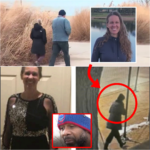Charlie Kirk’s Widow Stuns Funeral With Words: “I Forgive His Killer”

GLENDALE, Ariz. — Eleven days after conservative activist Charlie Kirk was gunned down in Utah, the political right gathered en masse to mourn, to rally, and to redefine his death as a symbol of resilience. What was intended by his assassin as a silencing bullet became, in the eyes of his supporters, the spark for one of the most charged memorials in recent American history.
On Sunday, Glendale’s State Farm Stadium — a venue more accustomed to hosting NFL games and international pop stars — became the heart of the conservative movement. Tens of thousands poured in, while thousands more were turned away once the arena’s 63,400 seats were filled.
The desert city briefly became the center of the American political universe.
A Widow’s Stunning Words

Amid chants, hymns, and waves of applause, the most unforgettable moment belonged to Erika Kirk, Charlie’s widow. Stepping to the stage, her voice trembling but resolute, she delivered a message that left the packed stadium in stunned silence.
“I FORGIVE HIS KILLER.”
The words, uttered less than two weeks after her husband was shot in the throat while addressing students at a Utah college, struck like a lightning bolt. Some wept openly, others applauded, and many simply bowed their heads in reverence.
“Charlie believed in grace, even when the world gave him no reason to,” Erika continued. “He loved this country, he loved his family, and he believed forgiveness was the most powerful act of all. So today, I choose forgiveness.”
Her decision to forgive, voiced before tens of thousands, was both an act of faith and defiance — a moment that instantly defined the day.
A Political Pilgrimage

The scale of the memorial underscored Charlie Kirk’s influence. At just 30 years old, the founder of Turning Point USA had risen from small student gatherings to building one of the largest conservative youth movements in America.
His death drew figures from across the “MAGA-sphere,” including former President Donald Trump, Vice President JD Vance, and nearly every prominent figure in the current Republican establishment. The atmosphere was part eulogy, part rally, part political pilgrimage.
Trump headlined the day’s tributes with a speech that was as fiery as it was emotional. He called Kirk “AN AMERICAN HERO” and promised to posthumously award him the Presidential Medal of Freedom. At one point, his voice rose as he declared:
“I HATE OUR ENEMIES. I HATE WHAT THEY STAND FOR. BUT I LOVE CHARLIE, AND I LOVE AMERICA.”
The crowd roared, chanting “USA” and “Charlie” for minutes on end.
A Movement United
For many in attendance, Kirk’s funeral was more than a farewell. It was a moment of unification for a conservative movement that has been fractured by infighting and political battles.
Vice President JD Vance praised Kirk as a “builder of courage,” crediting him with giving young conservatives a platform. “Charlie didn’t just start an organization,” Vance said. “He created a generation who believed their voices mattered.”
Around the stadium, Turning Point chapter leaders held banners, wore matching shirts, and prayed together. For them, Erika Kirk’s pledge to continue her husband’s work offered reassurance that the movement would not collapse without its founder.
The Atmosphere
The sheer spectacle of the day was undeniable. Thousands had queued for hours, some camping overnight, to secure seats. Vendors sold flags, pins, and t-shirts bearing Kirk’s image. Giant screens broadcast speeches to overflow crowds outside the stadium.
The mood oscillated between mourning and militancy. Tears flowed during musical tributes and eulogies, but the energy spiked when political leaders took the stage. For some, it felt less like a funeral than a rally — a fusion that reflected Kirk’s life, where activism and identity were inseparable.
Critics Speak Out
Outside the stadium, critics voiced unease at what they saw as politicization of tragedy. “This should have been a memorial, not a campaign event,” one local activist said. “Instead, it turned into a political theater.”
Still, the scale of attendance and the intensity of emotion left no doubt about Kirk’s influence. Love him or loathe him, his legacy has already reshaped the landscape of youth politics in America.
The Symbolism of Forgiveness
Yet, despite Trump’s fiery words and the political grandstanding, it was Erika Kirk’s moment of forgiveness that lingered most powerfully. In a climate defined by division and rage, her choice to forgive her husband’s killer was an act that transcended politics.
“She showed strength that most of us can only dream of,” one mourner said, wiping away tears. “She turned grief into something higher.”
The Bottom Line
Charlie Kirk’s assassination shocked America. His funeral, however, was transformed into a moment of spectacle, solidarity, and symbolism. Erika Kirk’s declaration of forgiveness stunned the world, Trump’s fiery tribute electrified his supporters, and the conservative movement found itself momentarily united in mourning and purpose.
In Glendale, grief became theater, and tragedy became rallying cry. For supporters, Charlie Kirk’s death was not the silencing of a voice, but the forging of a martyr. For critics, it was a reminder of the blurred line between politics and personal loss.
Either way, Charlie Kirk’s funeral was unforgettable — a moment when a widow’s stunning grace and a president’s fiery words etched themselves into America’s political story.
News
David Muir CRUSHES Competition! ABC World News Tonight DESTR0YS NBC by 1.6 MILLION — “UNSTOPPABLE DOMINATION!”
DAVID MUIR’S ‘WORLD NEWS TONIGHT’ DOMINATES THE NEWS RACE YET AGAIN, CRUSHING NBC BY 1.6 MILLION AND SEIZING #1…
David Muir Fans STUNNED as Anchor Suddenly Steps Away From ABC Desk — “THIS CHANGES EVERYTHING!” Pa.nic Erupts Online
VIEWERS SHAKEN AS DAVID MUIR STEPS AWAY FROM ‘WORLD NEWS TONIGHT,’ WITH LINSEY DAVIS LEADING COVERAGE OF DEADLY TAMPA…
Willie Geist sh0cks viewers after opening up about family health fears, hinting that a difficult decision may be ahead at NBC. Fans rush to learn what he revealed
Willie Geist Opens Up About Family Health Concerns, Sparking Emotional Reaction and Speculation About His NBC Future NBC’s longtime…
Stephen Colbert’s FINAL 7 WORDS Detonate Late-Night TV As Ri.vals Storm the Stage in Solidarity: “YOU WON’T SHUT ME UP EVER!”
THE AMERICAN BROADCAST OBSERVER “STEPHEN COLBER’T LAST STRIKE: THE MONOLOGUE THAT SHOOK LATE-NIGHT TELEVISION TO ITS CORE” The audience…
Jimmy Kimmel BREAKS DOWN On Air And Drops 7 Words That Freeze The Studio: “I’M DONE LETTING THIS HAPPEN!”
THE LOS ANGELES TRIBUNE “JIMMY KIMMEL’S 7 WORDS THAT FROZE A NATION: A PLEDGE BORN FROM GRIEF, FURY, AND…
Hoda Kotb STOPS Live TV With Hidden Baby Reveal No One Saw Coming… America FROZE On Air: “I NEVER SAW THIS COMING!”
THE NEW YORK STAR CHRONICLE When Hoda Kotb stepped onto the TODAY Show stage Tuesday morning, viewers expected the…
End of content
No more pages to load






